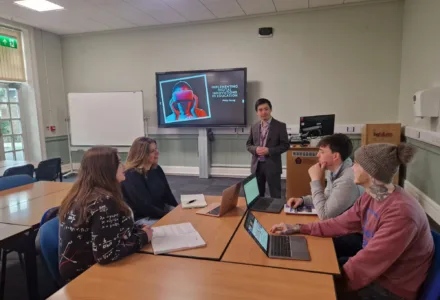Course summary
The Doctorate of Education (EdD) is the premier academic qualification for experienced professionals working in the education sector. The EdD is ideally suited to those who benefit from studying in a structured, collegiate environment with the first two years comprising taught modules. These modules enable the development of research skills and the intellectual rigour demanded of professionals at doctoral level. They also provide the foundation for the subsequent period of study, the thesis stage, during which a thesis is written focused on an area of professional interest.
BGU's continuing success in research, as demonstrated in the 2021 Research Excellence Framework exercise, gives us a significant presence within an increasingly competitive, research-intensive sector.
BGU offers a single entry system every Autumn, in October.

Let's get you started...
Apply for this course
When you're ready to apply, the route you take will depend on your personal circumstances and preferred method of study. Click the relevant button below to start your application journey.
About this course
The EdD (Doctorate of Education) is designed for those who intend to extend their professional development and understanding through research and reflection on practice. It is a part-time programme, typically taking 5 years to complete. The EdD is delivered entirely at BGU with the degree itself awarded by the University of Leicester.
The EdD comprises two stages. The first consists of five taught modules which are taken over the first two years of the programme. Sessions are delivered at weekends with tutorial and peer support provided in between, enabling you to combine your study with work commitments. The modules incorporate a variety of teaching and learning strategies covering a range of core research skills contextualised in professional issues. Sessions enable the systematic development of the high level of skills and knowledge required at doctoral level. Upon successful completion of the taught phase, you progress to the thesis stage. Here, you produce a thesis which is intended to provide an original contribution to professional knowledge and understanding in a focused area of enquiry.
What you will study
Students on this course currently study all of the following modules. Unless they have transferred from a doctorate at another organisation, and can provide documentary evidence of successful completed modules studied at doctorate level.
The module focuses on the importance of, and skills required for, critically engaging with, reviewing and evaluating the research literature, underpinned by an academic literacies approach, as a first step towards understanding the nature and purpose of academic writing for research purposes at doctoral level.
Students are immersed in key research methods in education, identifying those most pertinent to their own study, with a focus on the criticality required at doctoral level.
Having investigated research methods in D712, students acquire specialist knowledge of data collection tools, analysis techniques and gain practical experience of using quantitative and qualitative data handling software.
Students apply the knowledge, skills and understanding of the previous modules to design and carry out a small empirical study related to their project, which is peer reviewed and presented in the form of a journal paper.
This module enables students to write a detailed, critical and comprehensive thesis proposal which includes a pilot study and reflection on the implications of the pilot for the thesis. A formal presentation of the pilot is embedded in the module through a weekend conference to facilitate peer review and provide experience of presenting and defending their work to academic audiences.
During years 3-6 of the programme, students build upon and substantially extend and deepen the learning from their previous assignments and proposal to write a 55,000 word thesis on a topic at the forefront of an academic discipline or area of professional practice. The thesis makes an original contribution to an area of professional knowledge which is of publishable quality.
What Our Students Say
Discover what life is like at Bishop Grosseteste University from our students.
Entry requirements
The entry requirements for an EdD are normally a 2:1 or 1st Bachelors Honours Degree and a Master’s degree and at least three years’ professional experience. At the point of application, you will be able to demonstrate that you have already identified a potential research project within a chosen discipline or field of enquiry, which you should be able to discuss at an interview. It is a part-time programme, typically taking 5 years to complete. The EdD is validated by the University of Leicester but will be delivered at BGU.
If you’ve recently completed or studied a particular module as part of a previous qualification at another organisation, this may mean that you’re not required to undertake a particular module of your BGU course. However this must be agreed in writing at the start of the course and you must submit a formal application requesting such an exception.
How you will be taught
The first four taught modules are assessed by means of a 5,000 word written assignment or equivalent. The fifth module, the "transfer" module, is a 10,000 word thesis proposal. At the end of the transfer module, you will also complete a peer presentation. You must successfully complete both the 10,000 word assessment and the presentation in order to progress.
Upon successful progression to the final stage, you will prepare a thesis of not more than 55,000 words. Your thesis will be examined by an oral examination or ‘viva’ conducted by expert academics in the discipline or field of enquiry. Your thesis should make an original contribution to knowledge and be of publishable quality. Tutor support is provided for each assessment component and throughout the final thesis stage.
Careers & Further study
In an increasingly competitive professional environment, possession of an EdD and the title of ‘Doctor’ will distinguish you from the majority of colleagues. You will have critically evaluated your own professional practice and its relationship with theory, designed and conducted your own research, and gained increased professional confidence, all of which can enhance your opportunities for career progression.
How to Apply
Enquiries about the EdD should be directed to Dr Sheine Peart, Associate Professor in Access, Equality and Inclusion. Email sheine.peart@bishopg.ac.uk
There is a single annual entry point each October. The final date for receipt of applications for an Autumn start of the same year, is the Tuesday immediately after the second August bank holiday. Please submit your application by the dates shown in the table below.
- October 2025: 26th August 2025
- October 2026: 1st September 2026
- October 2027: 31st August 2027
- October 2028: 29th August 2028
You can apply here. As part of your application, you will need to provide a summary of your current or proposed research. In addition, you must submit a 2500-word research proposal, including 10 - 15 relevant references – please click here to view the information we require for this section. These can be attached as a Word document using the document upload function during the online application process.
Further information
It’s important to know when choosing a university to complete a PhD or EdD with that they have an excellent research department, facilities and resources. Here at BGU we are proud of our research background and support offered to students – click here for more information on our staff, current projects and how we can support you in your research endeavours.
We welcome prospective students to visit BGU to experience the campus and life here for themselves. We hold a number of Open Evenings for you to attend.
A lot of student finance information is available from numerous sources, but it is sometimes confusing and contradictory. That’s why at BGU we try to give you all the information and support we can to help to throughout the process. Our Student Advice team are experts in helping you sorting out the funding arrangements for your studies, offering a range of services to guide you through all aspects of student finance step by step. Click here to find information about fees, loans and support which will help to make the whole process a little easier to understand.
Please click here to view the regulations and policies surrounding these degrees.



































